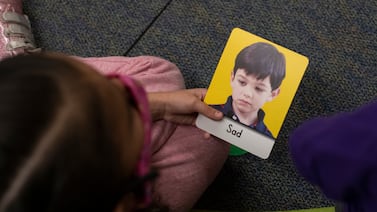Monday marks new beginnings as nearly 49,000 students in the Detroit school district return to class.
Classes will start just a few days after members of the Detroit Federation of Teachers ratified a new one-year contract deal that provides pay raises and bonuses for members.
The year begins with big questions about how Detroit will manage its enrollment challenges and protect students from the impact of budget cuts.
The new year also marks a stepped-up campaign against chronic absenteeism, as the district plans new health hubs to help kids attend school regularly and reassigns attendance agents to maximize their impact.
Here is what you need to know about some key issues facing in the district:
How will budget cuts affect students?
Detroit district officials made some strategic, but painful and controversial, cuts in the spring to balance the budget and account for enrollment losses and the depletion of federal COVID relief money.
The cuts have already hit hard, as summer school was scaled down significantly, leaving parents who wanted summer learning for their children scrambling for other options.
The big question for this school year is how the cuts will affect student learning. We already know that high school students will feel the cuts with the elimination of college transition advisers, whose job was to help students with the transition from high school to college or careers. Without that help, students may struggle to evaluate their postsecondary options and navigate the college selection process.
The district also eliminated several hundred administrative positions, including assistant principals, deans, and school culture facilitators in some schools. Some staff were able to switch to other positions in the district.
Enrollment challenges continue in Detroit
Nearly 49,000 students are enrolled in the Detroit district, down from nearly 51,000 before the pandemic.
Enrollment declines in Michigan schools can be dire financially. Schools are funded on a per-pupil basis, so the loss of each student in Detroit means about $9,600 less funding this school year.
For the last few years, the district was able to use federal COVID relief money to fill in gaps created by the enrollment loss. But that money is no longer available.
The question this school year is whether the district will see enough growth to stabilize its enrollment. Vitti shared some promising news at a recent school board meeting: As of Aug. 4, more than 2,500 new students had enrolled for the 2023-24 school year, compared with 1,626 at this time last year.
But he has also faced questions from the community and some board members about whether the district is doing enough, and whether its strategy to target preschool enrollment growth will work.
New chronic absenteeism strategies in place
The chronic absenteeism rate was 68% at the end of the last school year. That’s better than the 77% rate from the year before, but the rate of students missing a significant number of days is still high.
Chronic absenteeism is defined as missing 18 or more days in a school year.
This school year, the district is employing new strategies, and getting tougher on chronically absent students.
The district has shifted many of its attendance agents who were assigned to individual schools to work in the central office to provide districtwide attendance outreach. Schools with the highest rates of chronic absenteeism will retain their agents; some will receive an additional agent.
Meanwhile, the district is considering a new policy that would force chronically absent students enrolled in a school outside their neighborhood to attend a school closer to their home. Vitti has also proposed a policy that would force students who missed more than 50% of the school year to repeat a grade.
Lawsuit settlement means more literacy help for students
Michigan lawmakers approved a budget that provided the Detroit district with $94.4 million to settle a 2016 lawsuit over the quality of reading instruction. The suit alleged the state was complicit in poor education outcomes for students while the district was under the control of state-appointed emergency managers.
The lawsuit was settled in 2020, with the stipulation that Gov. Gretchen Whitmer would propose the $94.4 million. It took three years to get it through the Legislature.
The district now has additional resources to address longstanding challenges with literacy. DPSCD officials have already shared proposals to use the money to hire academic interventionists to provide one-on-one support to students struggling with reading.
The Detroit Literacy Equity Task Force was created after the settlement agreement was signed and includes representation from teachers, district administrators, students, support staff, and the community. It is tasked with holding a series of community meetings to get input from the public on how the money should be spent and with developing recommendations to the district based on the input. Those recommendations are due by June 30.
The group held its first community meeting Monday.
Student and families to get help at health hubs
The district will open five health hubs at high schools this school year. The hubs are designed to provide students and families with the medical resources and services they need to ensure that students attend school regularly.
Twelve health hubs in total will open in the district over a three years.
Funding comes from a $2.76 million grant from the Ballmer Group and a combined $1.8 million from the W.K. Kellogg Foundation, Kresge Foundation, and Children’s Foundation. (The Kellogg and Kresge foundations are Chalkbeat funders.)
School leaders have increased flexibility to suspend students
School leaders in the Detroit district have broader authority to deal with discipline problems thanks to a change in the district’s code of conduct.
Under revisions approved by the school board, deans and principals have greater flexibility to impose out-of-school suspensions, and could suspend a student after just the first instance of fighting. It marks a sharp reversal from less punitive policies the district adopted just five years ago.
The changes have drawn criticism from some students and advocates who fear school officials will use suspensions in place of other interventions and strategies.
But they are in line with what’s been happening across the country as lawmakers make it easier to kick disruptive students out of school. The pivot toward stricter discipline reflects growing concerns about student behavior and school violence.
Lori Higgins is the bureau chief for Chalkbeat Detroit. You can reach Lori at lhiggins@chalkbeat.org.







